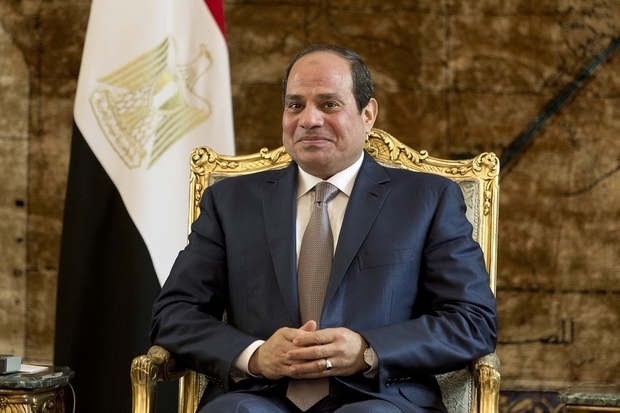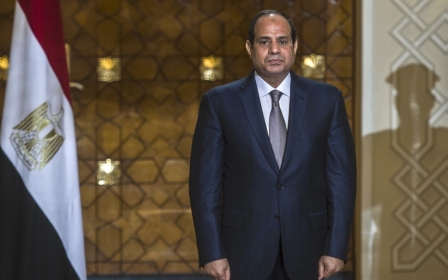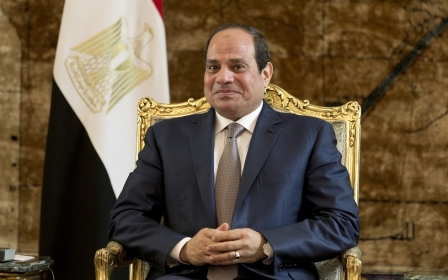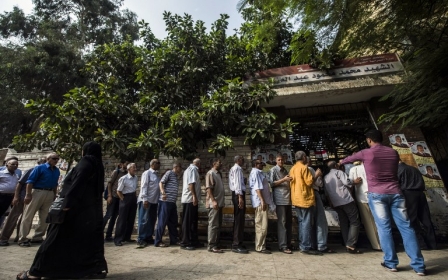Sisi's visit to normalise Egypt-UK relations, say analysts

Egyptian President Abdel Fatah al-Sisi’s visit to the UK this week hopes to send a message of legitimacy and normalisation, according to observers.
“This visit signals a change towards normalisation with regards to the human rights violations happening in Egypt since the 2013,” said Omar Ashour, a senior lecturer in Middle East politics and security studies at Exeter University.
“The visit signals that for the UK, human rights issues are marginal in the face of security threats, the outflow of refugees and regional instability if Egypt collapses," he added, while also referring to the importance of Egypt as a strategic location for economic investment.
Maha Azzam, head of the Egyptian Revolutionary Council, a broad coalition calling for the return of civil-society democracy to Egypt, said: “Sisi’s coming to the UK is part of his larger strategy to visit various countries of influence, particularly Western democracies, in order to cement his legitimacy and send the message that he is the right partner in the fight against violent extremism and instability in Egypt.”
Sisi plans to arrive in London this week after the British Foreign and Commonwealth Office (FCO) confirmed that he will visit London after receiving an official invitation from the British government in June. Once in London, he is expected to meet with British Prime Minister David Cameron.
While Sisi's agenda has not been released publicly, the Foreign Office Minister Tobias Ellwood said that "discussions will take place with President Sisi on a wide range of issues of mutual interest, including trade and security".
Security and trade
Observers have pointed towards bilateral security and trade relations as topping the agenda.
“It is likely that the visit will include a discussion of Islamic extremism, what is happening in Libya, Yemen and Syria as well as bilateral security and economic relations,” said Chris Doyle, director of Caabu, an organisation working on advancing Arab-British relations.
With the UK as one of Egypt’s main foreign investors, some observers have speculated that his visit could also include the signing of several business deals, potentially including for weaponry which the Egyptian government has been steadily buying in recent months.
“The visit points towards the importance the UK government attaches to theses issues and how it is primarily concerned that Egypt does not fall into a state of collapse like neighbouring countries,” added Doyle.
According to Azzam: “The other objective behind this visit is to say that Egypt is open for trade and business and to allow for British investment and armed sales."
More importantly for Sisi, the visit carries great significance and will play an important role in building his image and power in Egypt, say analysts.
“In Egypt, Sisi will be seen as a world player, restoring Egypt as a key player in the region,” said Doyle, adding that Egyptian media is unlikely to cover the hostile reaction of several UK politicians to the human rights violations in Egypt.
On 15 October, Green Party MP Caroline Lucas, who raised Sisi's proposed trip to London with the British foreign secretary in June and was subsequently one of 44 MPs who called for his invitation to be rescinded, asked once again for details about the visit, but the government refused to be drawn on details.
The UK government is likely to respond to criticisms of the visit by arguing that for national interests, it is essential that the UK maintain strong relations with Egypt, said Doyle.
"It remains questionable if these relations should be maintained in a fashion which appears to be endorsing all that is going on in Egypt," he added.
Step in the wrong direction
While the UK may seek stronger relations with Egypt in order to ensure its national security and regional stability, some observers believe this step could jeopardise the UK's image as a champion of human rights and make the country less safe.
“The fact that UK has taken the step of inviting Sisi, while many leaders in the West have been reluctant to do so is significant,” said Shadi Hamid, senior fellow at the Brookings Institution.
“Egypt’s human rights situation is the same if not even worse… and while Britain is not a human rights organisation, it is sending out a message that its is happy to continue to do business with an autocratic regime that is unusually authoritarian and repressive,” added Hamid.
Azzam agrees: “It is a miscalculation on the part of Cameron to be closely allied with such a regime. Stronger ties with the Egyptian regime will endanger the UK, placing it at the heart of extremism and will cause radicals and extremists to see Britain as a potential target.”
The visit has greatly angered Egyptian opposition figures, many of whom have been imprisoned or fled the country since Sis came to power in 2013.
“Through this visit, Cameron is sending a clear message to millions of Egyptian youth that he will continue turning a blind eye to all the regime’s violations in Egypt,” said former Egyptian investment minister Yahya Hamed.
At least 1,000 demonstrators were killed in the August 2013 Rabaa massacre accoring to Human Rights Watch report, while more than 40,000 Egyptians are in political detention.
“By this, Cameron is betraying all values and principles of democracy and human rights,” added Hamed.
Middle East Eye propose une couverture et une analyse indépendantes et incomparables du Moyen-Orient, de l’Afrique du Nord et d’autres régions du monde. Pour en savoir plus sur la reprise de ce contenu et les frais qui s’appliquent, veuillez remplir ce formulaire [en anglais]. Pour en savoir plus sur MEE, cliquez ici [en anglais].




